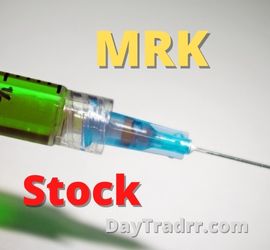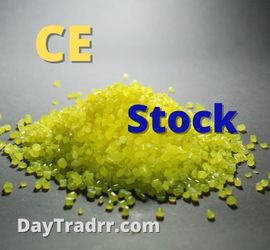MRK Stock – What Investors Should Know About Merk & Co.
 Merck & Co., Inc. (MRK stock symbol) is a multinational pharmaceutical company offering health solutions through its prescription medicines, vaccines, biological therapies, and animal health products. Merck develops pharmaceuticals to treat a wide range of conditions. For example, cardiovascular disease, asthma, cancer, and infections. Within cancer, the company’s immuno-oncology platform is becoming a significant contributor to overall sales. In addition, the company has a sizable vaccine business, with treatments for hepatitis B and pediatric diseases, as well as HPV and shingles. Merck has collaborations with AstraZeneca PLC; Bayer AG; Eisai Co., Ltd.; Ridgeback Biotherapeutics; and Gilead Sciences, Inc. to jointly develop and commercialize long-acting treatments in HIV. Merck & Co., Inc. was founded in 1891 and is headquartered in Kenilworth, New Jersey.
Merck & Co., Inc. (MRK stock symbol) is a multinational pharmaceutical company offering health solutions through its prescription medicines, vaccines, biological therapies, and animal health products. Merck develops pharmaceuticals to treat a wide range of conditions. For example, cardiovascular disease, asthma, cancer, and infections. Within cancer, the company’s immuno-oncology platform is becoming a significant contributor to overall sales. In addition, the company has a sizable vaccine business, with treatments for hepatitis B and pediatric diseases, as well as HPV and shingles. Merck has collaborations with AstraZeneca PLC; Bayer AG; Eisai Co., Ltd.; Ridgeback Biotherapeutics; and Gilead Sciences, Inc. to jointly develop and commercialize long-acting treatments in HIV. Merck & Co., Inc. was founded in 1891 and is headquartered in Kenilworth, New Jersey.
More About Merck & Co.
The company operates in three divisions: Pharmaceutical, Animal Health, and Other.
- Pharmaceuticals – Human health pharmaceutical and vaccine products are included in the Company’s Pharmaceutical segment. Its human health pharmaceutical products include therapeutic and preventive agents for the treatment of human disorders, which are typically sold by prescription. These human health pharmaceutical products are primarily sold by the Company to drug wholesalers and retailers, hospitals, government agencies, and managed health care providers such as health maintenance organizations.
- Animal Health – The Animal Health segment creates, manufactures, and sells a variety of veterinary pharmaceutical and vaccine products. This includes digitally connected identification, traceability, and monitoring products. Also, health management solutions and services, for disease prevention, treatment, and control in all livestock and companion animal species.
- Other – The Other segment consists of sales for the non-reportable segments of healthcare services.
The Company previously had a Healthcare Services segment. It provided engagement, health analytics, and clinical services to improve the value of care delivered to patients. However, in the first quarter of 2020, the Company divested the remaining businesses in this segment.
MRK Stock: Annual Reports – Financials – SEC Filings
Merck & Co., Inc. is incorporated in the state of New Jersey. Merck & Co., Inc is primarily in the business of pharmaceutical preparations. For financial reporting, their fiscal year ends on December 31st. This page includes all SEC registration details as well as a list of all documents (S-1, Prospectus, Current Reports, 8-K, 10K, Annual Reports) filed by Merck & Co., Inc.
Merck develops pharmaceuticals to treat a wide range of conditions, including cardiovascular disease, asthma, cancer, and infections. Within cancer, the company’s immuno-oncology platform is becoming a significant contributor to overall sales. In addition, the company has a sizable vaccine business, with treatments for hepatitis B and pediatric diseases, as well as HPV and shingles. Additionally, Merck sells animal health-related drugs. From a geographical perspective, close to 40% of the firm’s sales are generated in the United States.
MRK Stock Dividend
Since April 2, 1973, Merck & Co Inc has paid quarterly dividends to its shareholders. Merck & Co Inc had a relative dividend yield of 2.6% as of November 26, 2022. This favorably compares to the Pharmaceuticals industry median of 0.0%. Last year, Merck & Co Inc’s dividend yield was 3.5%. Merck’s quarterly dividends range from $0.23 to $0.96 per share since 1973. The company’s dividend yield has averaged 3.3% per year over the last five years.
- Merck & Company’s previous ex-dividend date was on Sep 14, 2022. Merck & Company shareholders who own MRK stock before this date received Merck & Company’s last dividend payment of $0.69 per share on Oct 07, 2022. MRK’s annual dividend yield is 2.58%.
- MRK’s past year’s earnings per share were $6.01. MRK stock’s annual dividend per share is $2.76. The company’s dividend payout ratio is 35.98% ($2.76/$6.01) which is sustainable.
Overall, Merck & Co Inc’s current dividend yield is 2.6%, which ranks in the 79th percentile among all U.S.-listed dividend-paying stocks. Its compound average dividend growth rate is 7.5% over the last five years. Merck & Co Inc has a Dividend Valuation Grade of D, a Dividend Growth Grade of A, and a Dividend Strength Grade of B. (Source: aaii.com)
MRK Stock Forecast
- The 21 analysts offering 12-month price forecasts for Merck & Co Inc have a median target of 110.00, with a high estimate of 125.00 and a low estimate of 100.00. The median estimate represents a +2.36% increase from the last price of 107.46. (Source: money.cnn.com)
- Based on 16 Wall Street analysts offering 12-month price targets for Merck & Company in the last 3 months. The average price target is $110.40 with a high forecast of $122.00 and a low forecast of $100.00. The average price target represents a 2.70% change from the last price of $107.50. (Source: tipranks.com)
Is MRK Stock a Buy Sell or Hold?
Merck & Co. has more than six blockbuster drugs in its portfolio. Keytruda is a PD-L1 inhibitor approved for several types of cancer. This drug accounts for roughly 40% of the company’s pharmaceutical sales. Keytruda has been critical in driving Merck’s consistent revenue growth over the last few years. For that reason, Keytruda is Merck’s most important asset and a compelling reason to own the stock. However, it can also be argued that Merck is overly reliant on the drug. Therefore, the company should aggressively look for ways to diversify its product lineup.
Merck is definitely on an uptrend, breaking past $100 as October ends to establish new 52-week highs. The stock’s catalyst was its sterling Q3 report last week where it beat earnings and revenues and upgraded its forecast. Year-over-year, earnings were up 4% (7% if you exclude the impact of the strong USD) and revenues rose 14% (18% considering currency). Drivers were strong sales of Merck’s cancer drugs and many vaccines. The pharmaceutical side boasted a 13% hike in sales YOY. Merck’s key drug, Keytruda, saw sales jump 20%. One of the new weaknesses in Merck was its animal health business where the strong greenback depressed sales by 3%. (Source: stockchase.com)
MRK Stock Risk Factors
Merck depends on its patent rights
If the company’s patent rights are invalidated or circumvented, its business could suffer materially. Patent protection is critical to marketing human health and animal health products in the United States and most major foreign markets Patents covering new products typically provide market exclusivity. This is critical for successfully marketing and selling the company’s newer products. Merck seeks patents for each of its products in each of the markets where the products are intended to be sold. Additionally, wherever meaningful patent protection is available. However, even if the Company obtains patents for its products, third parties or government authorities may challenge, invalidate, or circumvent its patents and patent applications. It is critical for the Company’s business to successfully assert and defend the patent rights that provide its products with market exclusivity.
New drugs have a long and expensive development cycle
To stay competitive, the Company, like other major pharmaceutical companies, must continue to introduce new products. There are expected declines in product sales following the loss of market exclusivity. This means that the Company’s future success is dependent on its pipeline of new products. For example, new products developed through collaborations and joint ventures. As well as products obtained through license or acquisition. To accomplish this, the Company devotes significant effort, funds, and other resources to research and development. Merck undertakes this R&D both internally and through various collaborations with third parties.
However, the research and development process for new drugs and vaccines is fraught with failure. As a result, there is a high risk that the Company’s funds invested in research programs will not generate financial returns. The fact that this research has a long investment cycle adds to the risk profile. It can take a decade or more to bring a pharmaceutical compound from the discovery phase to market. Unfortunately, failure can occur at any point in the process, including later in the process after significant funds have been invested.
A handful of key products generate a significant amount of the Company’s profits and cash flows
- Loss of patent protection
- Increased manufacturing costs,
- Generic or over-the-counter availability of a competitive product
- Discovery of previously unknown side effects that overturn the results of post-approval trials
- Competition from the introduction of new, more effective treatments, and the
- Discontinuation or removal of the product from the market for any reason.
Up Next: CE Stock – What Investors Should Know About Celanese Corp.
 Celanese Corp. (CE stock ticker) is a global chemical and specialty materials provider that makes polymers for use in a variety of different commercial applications. The company leverages extensive customer engagement to structure projects that are aligned with key corporate competencies. This allows the company to address critical customer needs and ensure success. Engineered Materials development and growth are driven by the commercialization of new projects in the company’s pipeline business model.
Celanese Corp. (CE stock ticker) is a global chemical and specialty materials provider that makes polymers for use in a variety of different commercial applications. The company leverages extensive customer engagement to structure projects that are aligned with key corporate competencies. This allows the company to address critical customer needs and ensure success. Engineered Materials development and growth are driven by the commercialization of new projects in the company’s pipeline business model.- The company’s project pipeline model takes advantage of its unique competitive advantages. For example, global assets and resources, market presence, diverse material portfolio, and differentiated capabilities. Celanese Corp’s global assets and resources are represented by operations in all regions of the world. This includes Brazil, China, Germany, India, Italy, Mexico, South Korea, the United Kingdom, and the United States. Also, there are sites associated with the company’s three strategic affiliates in Saudi Arabia, South Korea, and the United States. The company was founded by Camille Dreyfus and Henri Dreyfus in 1918 and is headquartered in Irving, TX.




